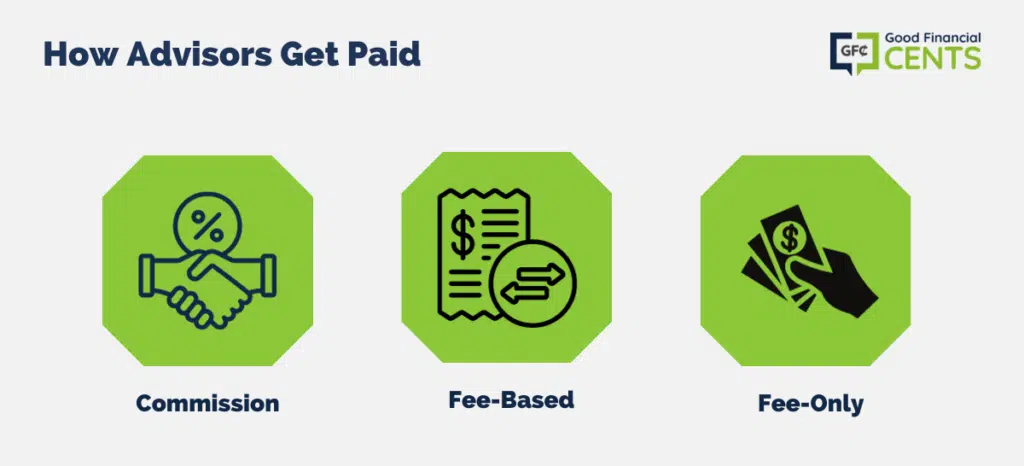What’s the #1 Question You Should Ask a Financial Advisor Before You Hire Them?
Hint: It has everything to do with money.
In particular – your money.
In this podcast, I address the #1 question you should ask your financial advisor before you agree to hire them.
I then dive into the different ways that advisors get paid, including how I get paid.
Enjoy!
Table of Contents
Ask Your Advisor, “How Do You Get Paid?”
- In the financial services industry, there are many different ways that advisors get paid.
- Compensation is slightly different for every financial planner
- Charges are not always very transparent; it can be very frustrating if you don’t know what you’re paying for.
- When you ask this question, you’re checking the advisor’s response. They should be able to articulate what you will pay and how much they will get paid so that you have a clear understanding of what is leaving your account each month/quarter.
- If they answer in a way that makes you uncomfortable (if they don’t clearly explain this issue, or if they dodge the question entirely), thank them for their time and move on to the next advisor.
The Importance of Transparency in Financial Advisory
One of the most important aspects of a financial advisor-client relationship is trust. Trust is often built on transparency and honesty. A transparent financial advisor will not only discuss how they get paid but will also provide you with insights into the implications of their compensation structure on your financial planning.
For instance, an advisor paid on commission might be inclined to recommend products that offer them higher commissions rather than those that are best suited to your needs. On the other hand, a fee-based or fee-only advisor, since they do not earn commissions, might be viewed as having fewer conflicts of interest. It’s important to understand these nuances to make an informed decision.
Having said that, it’s worth noting that every payment structure has its pros and cons. A commission-based advisor might have more knowledge about a broader range of products, while a fee-only advisor might focus on providing holistic financial planning. Your needs and financial goals should be at the forefront of any discussion with an advisor.
Navigating the Complex World of Financial Licenses
In the financial world, licenses are not just pieces of paper or mere formalities. They indicate the advisor’s area of expertise and, more importantly, what they can or cannot offer you. For example, an advisor with only an insurance license is limited in the products they can suggest, and it would be a mistake to assume they can provide comprehensive financial planning.
It’s crucial to understand what each license means. A Series 7 license indicates the advisor can sell individual stocks and bonds, among other investment products. A Series 6 license is more limited, allowing the advisor to sell mutual funds and certain types of annuities.
Meanwhile, an insurance license is even more specialized. By understanding these distinctions, you can better gauge if an advisor is equipped to handle your specific financial needs.
Furthermore, it’s not just about the licenses. Inquire about their experience their past client dealings, and even ask for references. A well-rounded perspective on an advisor’s qualifications will provide you with greater confidence in your decision.
How Different Advisors Get Paid:
Commission
- Advisor gets paid by selling you a product. When they sell, they get paid a commission.
- For example, if an advisor sells you a front-loaded mutual fund, the commission starts off at 5.75% and then goes down depending on how much you invest. You get discounts for investing larger amounts of money. So, if you invested $10,000 into a front-loaded mutual fund, the advisor will get paid $575 upfront, which comes out of your investment.
- After the initial commission, the advisor makes a small “trill,” which is approximately 0.25% ongoing, but if you never invest in that mutual fund again, the advisor only gets that one upfront commission
- Commissions vary on the type of investment product
- When I first got started in the business, we were often encouraged to sell front-loaded mutual funds. The selling point is that if you buy a mutual fund and hold it for 7+ years, paying the upfront cost makes sense. You still have the ongoing costs, but other methods can be more expensive.
- I realized that the buy-and-hold strategy doesn’t work too well. If you need to change to another mutual fund 2-3 years down the road, then you pay another commission.
- Going the commission route depends a lot on strategy and what you’re trying to achieve, but it often ends up being more costly for the client.
- You can switch mutual funds within the same company without incurring another sales charge, but just because a company has many mutual funds, it doesn’t mean that they are all good.
- This type of advisor can sell life insurance (term, whole), stocks, bonds, and annuities (variable, fixed, index, etc.).
- Typically, the longer the term of the annuity contract, the greater the commission.
- There are different licenses to get commissions. Selling stock = Series 7 license, selling mutual funds or certain types of annuities = Series 6 license, and selling other types of annuities or insurance products = insurance license, EXCEPT in the case of a variable annuity, which requires a Series 7 license.
- If an insurance agent is coming across as a comprehensive financial planner, but all they have is an insurance license, the only thing they can offer is an annuity or life insurance.
- No stocks, no bonds, no mutual funds – not really “comprehensive.”
- After asking how your advisor gets paid, ask him or her what kinds of licenses he or she has.
Fee-Based
- This can get confusing with Fee-Only advisors.
- This type of advisor is a “hybrid” of the Commission and Fee-Only advisors. Fee-based can make a commission by selling a stock, bond, or mutual fund, or they can charge a fee based on the percentage of assets under management.
- For example, if you have a $100,000 portfolio and the advisor charges 1%, you will pay $1,000 per year for that advisor to manage your portfolio.
- Depending on how the advisor works, you might incur transaction charges, but you will not be dealing with commissions.
Fee-Only
- This type is the most recognized as the least likely to take advantage of a client.
- Fee-only advisors can charge hourly/on retainer (which is an upfront charge)/percentage of assets under management.
- There may be financial planning fees, which are separate from investing fees.

How Do I Get Paid?
- I am a fee-based advisor.
- When I first started in this business, I had a Series 7 license. I sold front-loaded mutual funds, annuities, and term life insurance.
- When I started Alliance Wealth Management, I dropped my Series 7 and lost the ability to earn a commission on selling a stock or mutual fund. That doesn’t mean my clients can’t buy those products; they can; they just don’t pay a commission on them. All they pay is a percentage, which is the ongoing fee.
- I’m fee-based, not fee-only, because I retained my insurance license. I sell term life insurance and fixed annuities. Some clients want an income guarantee, and an immediate or index annuity can make sense for the client.
- When I first dropped my Series 7, I wasn’t really familiar with all the other types of annuities that existed, but I lost some big potential clients because they didn’t want to do investment management, they wanted a guarantee, and I didn’t know what I could offer them.
- I quickly became well-versed in different annuities, and I found that there are good products for individuals with specific needs.
- With the term life insurance, it just didn’t make sense to drop my insurance license solely for the ability to call myself a Fee-Only advisor.
The Bottom Line – GF¢ 023: How Do Financial Advisors {REALLY} Get Paid
Navigating the financial world can often feel like navigating a maze, with each decision potentially leading to a different outcome. Choosing a financial advisor is no exception. Understanding how they are compensated is a significant step towards building a trust-based relationship.
Remember, it’s not just about how they get paid but also the transparency with which they communicate it. The type of compensation might influence their product recommendations, but it’s their expertise, trustworthiness, and commitment to your financial well-being that truly matter.
Different licenses and modes of compensation cater to varied financial needs and preferences. Ensure your chosen advisor aligns with your goals, providing clarity on every aspect of your financial journey. In the end, an informed decision is your best asset, empowering you to secure a brighter financial future.
Click here to subscribe to the “Good Financial Cents” Podcast on iTunes.








I noticed you advise on index annuities. Curious as to your thoughts on the typical high surrender charges and long surrender schedule of index annuities.
Rarely have I seen an index annuity with a surrender schedule less than 10 yrs. Also, many have some bonus at the beginning but huge surrender charges making the client “stuck” in the product with a low “guaranteed” return on investment.
You’re an awesome dude, so don’t take this as “hatin'” on you. More just curious because I haven’t seen a good index annuity in the industry.
Thanks!
The Warrior
NetWorthWarrior.com
@ The Warrior No worries on “hatin” 🙂 Annuities can be the worst investments if used inappropriately (which unfortunately happens too often).
I typically don’t like index annuities for anyone 50 or younger. I’m a believer in the markets and even after horrible ones like 2008, the market always seems to come back. If you’re younger, ride out the waves and you should be much better off.
Where I do like indexed annuities are for individuals who are closer to retirement and need some sort of income guarantee. I would never use it for the entire portfolio but can easily make the case to use an indexed annuity for the bond portion of their portfolio.
Do I use it for all clients? Absolutely not. But I will at least bring it to their intention so they are aware of all their options.
So short answer is, I’m not a big fan of indexed annuities for “growth” but I do like them for income protection.
Hope that helps!
Great article. Thanks for posting.
Our family has a pretty good financial advisor but we will definitely consider this valuable reference tool the next time we are in search for one. In fact, I know a friend who is looking for one and will be sharing this article with them. Thanks again.